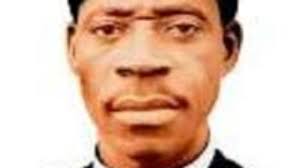Joseph Ayo Babalola was born on the 25th of April, 1904. He was the first General Evangelist of the Christ Apostolic Church, popularly called CAC in Nigeria. He was credited with healing powers. He was also married to Deaconess (Mrs) Dorcas Babalola.
Background and Early Life
Babalola was born of Yoruba parents at Odo-Owa, Kwara State, Nigeria. He was brought up as an Anglican. He was registered at an elementary school at Oto-Awori on Badagry Road, Lagos State in 1914. He got to standard four before he became a blacksmith’s apprentice and he learned it for two years before he became a steamroller operator under the PWD (Public Works Department) under the colonial government and later a steamroller driver. After 15 days of learning to drive the caterpillar, he was able to drive it without any assistance. After nine months, he became a master in his class. A steamroller was first given to him on 1 April 1928 to work on the Osogbo – Ilesha road. On June 14, 1928, he was transferred to Akure – Ilesha road. Babalola was baptized in Lagos lagoon in December 1929.
Read more about Nigerians in history
Call to Ministry

His first encounter with God, after hearing his voice, was when the angel of the Lord told him to enter his house and instructed that he fasts for six days and pray 120 times. Faithfully he did this and as he slept that night, an angel entered into his room like lightning and began to talk to him. Then the angel told him to put off the light inside the room which he immediately did. Thereafter a brighter light completely different from any other lighted the whole room. The angel told him not to taste any manner of food for six days that the Lord Jesus Christ wants to send him on some important works to various towns.
The angel told him that he was the one who had been talking to him on the road when he was driving and that he would have died if he had refused to hearken to his instructions. That is how he received the call and he went into a series of fasting and prayer, all the while he was in Ipetu-Ijesha in Oriade local government area of Osun state. During this period of fasting and prayers, he received lots of revelations which formed the base for the way he operated in his ministry. He later joined the Faith Tabernacle Church in November 1929 where he was baptized in Lagos lagoon in December the same year.
Following the voice of the Lord in 1928, Apostle Babalola performed his first miracle, which also kicked off the revival of his mission, with the raising of a dead child in September 1930. Following this, three weeks later, was the healing of about 100 lepers, 60 blind people and 50 lame persons. This resulted in the desolation of Churches in Ilesa because their members transferred their allegiance to the revivalist and that all the patients in Wesley Hospital, Ilesa, abandoned their beds to seek healing from the Apostle. This divinely kicked off The Great Revival of the 1930s, which saw people coming from many parts of Nigeria Africa and abroad, however, without Apostle Babalola printing any posters and doing TV adverts.
Ministry and Healing

In 1931, Faith Tabernacle affiliated with The Apostolic Church, whose general headquarters in the United Kingdom (and not British Apostolic Church, as erroneously asserted by some authors). Then following a schism in The Apostolic Church around 1940, Babalola went with a group led by Pastors J.B. Akinyele and D.O. Odubanjo to form a new independent church, Christ Apostolic Church (CAC), where he continued his healing and revivalistic activities until his death on the 26th of July 1959.
The CAC regards Babalola as an apostle, while in an actual sense church ordination, he was not at any time historically ordained into that office. A CAC retreat centre was built at Ipo Arakeji, Osun State where Babalola was first called in 1928. However, Babalola was not the sole founder of CAC as many claims today but one of the trio of CAC Founding Fathers.
Sign up to the Connect Nigeria daily newsletter
The Christ Apostolic Church did not end with the death of Apostle Joseph Ayo Babalola in 1959. In fact, it has grown rapidly over the years, with many churches under the umbrella of Christ Apostolic Church name though each branch bears a unique branch name. The Joseph Ayo Babalola University (JABU), a private Nigerian university located in Ipo Arakeji and Ikeji-Arakeji, two neighbouring communities in Osun State, established by the Christ Apostolic Church (CAC) Worldwide is named after him, located at the place where he says he was called by God in 1928.
References
ekimogundescendant.org
wikipedia
Featured image source: Church Times Nig
Got a suggestion? Contact us: [email protected]

